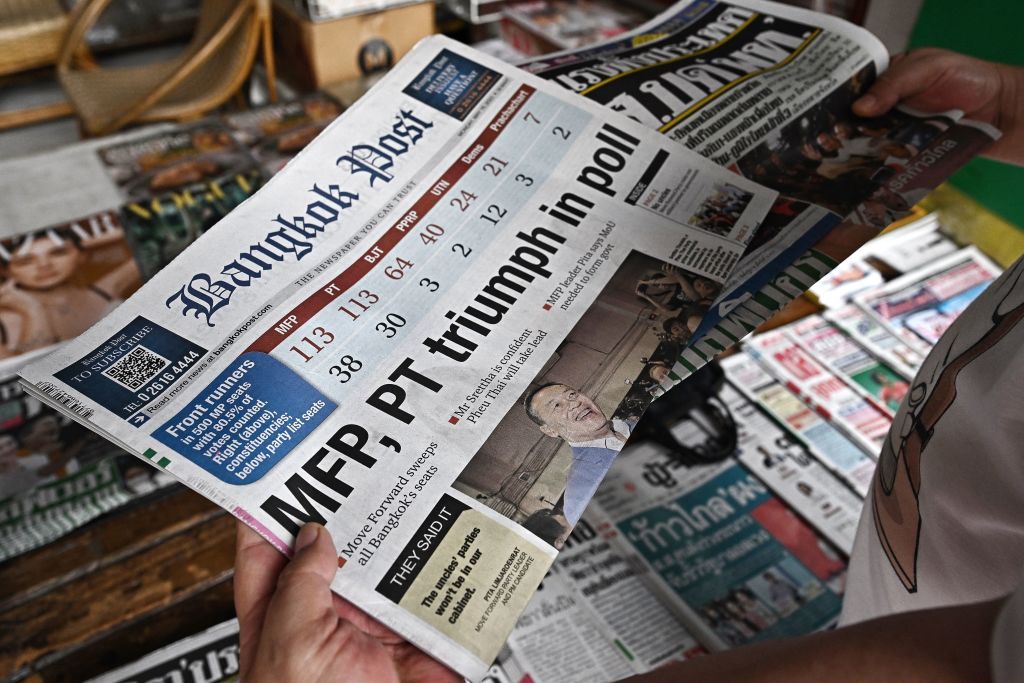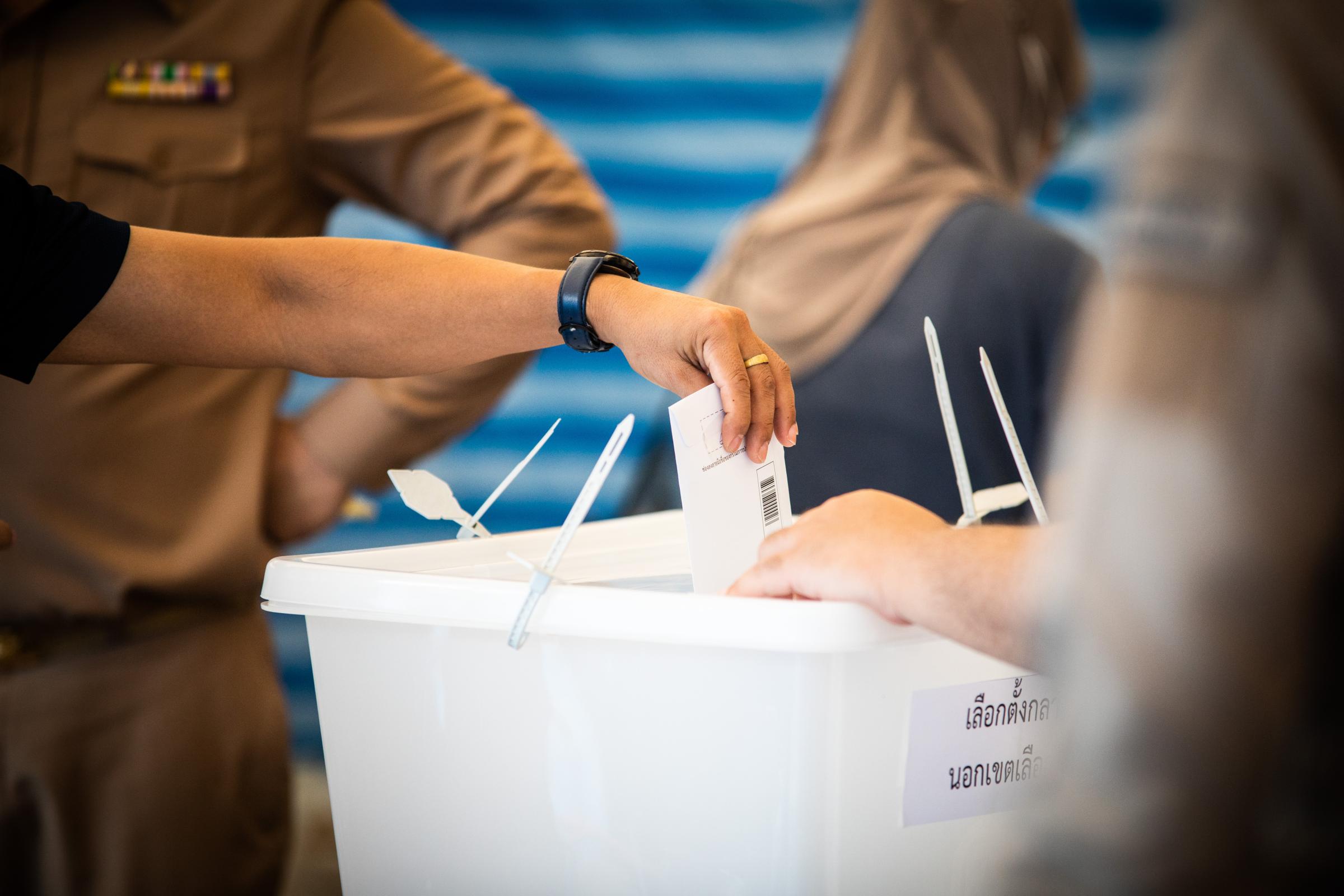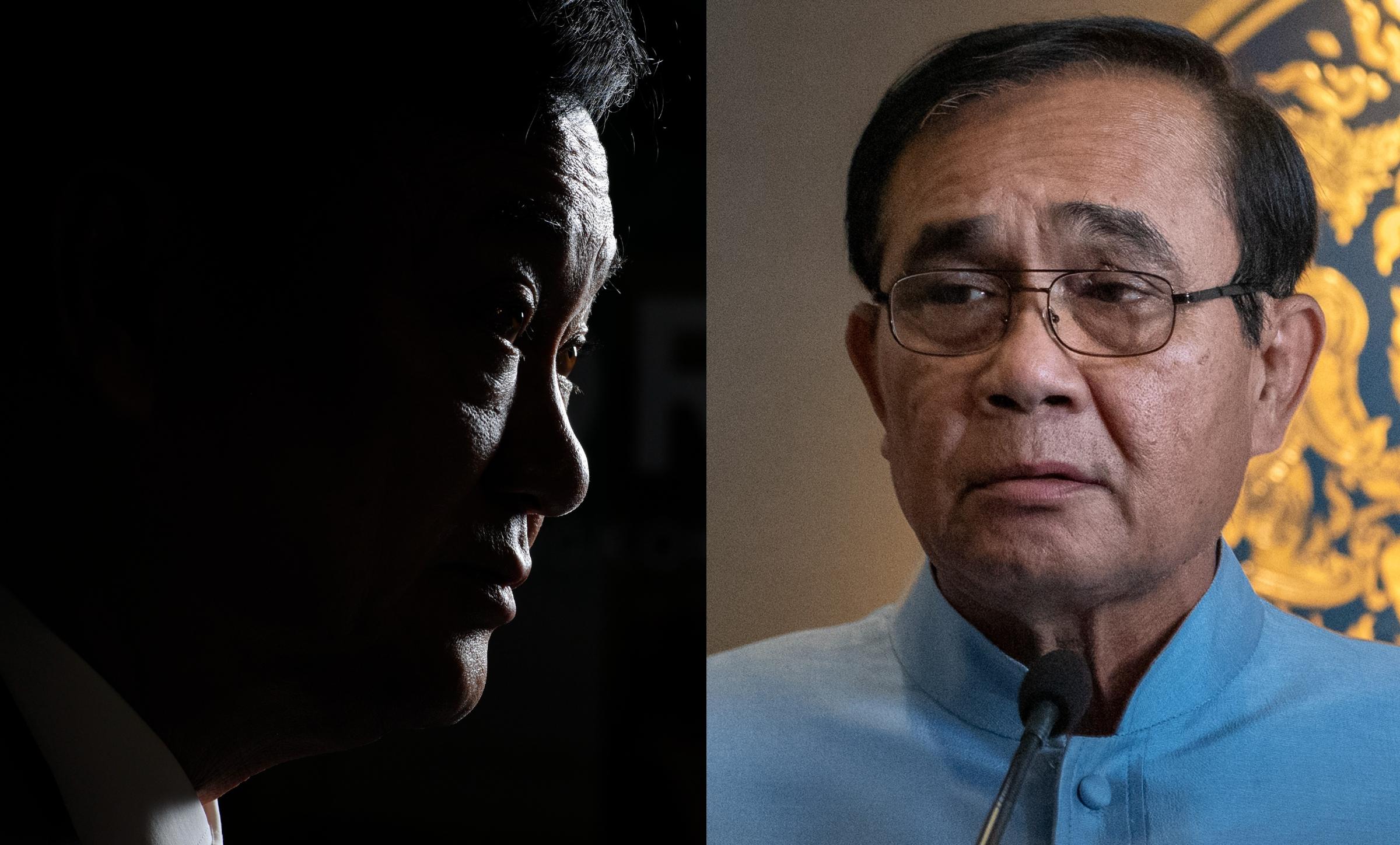For the Thai establishment, this was the worst imaginable result.
With nearly all votes counted in Sunday’s general election, the progressive Move Forward Party—which campaigned on stripping power from Thailand’s conservative power nexus centered on the military generals and royal palace—polled best with 151 seats in the 500-strong Lower House. In second place, with 141 seats, sits another opposition party: Pheu Thai of exiled billionaire Thaskin Shinawatra, whose populist political machine is loathed by the Bangkok-based elites and whose ousting in a 2006 coup d’etat uncorked years of political turmoil.
Meanwhile, the military-backed United Thai Nation Party of incumbent Prime Minister Prayuth Chan-ocha, the general who led the 2014 coup that toppled Thaksin’s sister when he was army chief, received just 36 seats in a damning indictment of how his royalist administration has run Southeast Asia’s No. 2 economy.
“It’s a clear rejection of the status quo and a crying call for change and reform,” says Thitinan Pongsudhirak, professor of political science at Chulalongkorn University in Bangkok.
The late surge behind Move Forward stunned predictions of a landslide for Pheu Thai, with particularly young Thais—including 3.3 million first-time voters—backing the upstart party’s bold pledges to weaken the political role of brass hats and amend the nation’s strict royal defamation law, known as Article 112, which critics say is increasingly wielded to stifle dissent.

“It is now clear that Move Forward has gained the immense trust of the people and of the country,” Move Forward leader Pita Limjaroenrat, a 42-year-old, Harvard-educated former executive for ride-hailing firm Grab, posted on Twitter early Monday morning. While Move Forward has previously been popular among young Thais, its bold reformist agenda demonstrated an unexpected appeal among the older generation also. “People want change, but they want bigger change than everyone was expecting,” says Aim Sinpeng, a senior lecturer at the University of Sydney.
The result means “the possibility of a Move Forward and Pheu Thai coalition government has become much more likely,“ says Napon Jatusripitak, a visiting fellow at the ISEAS-Yusof Ishak Institute in Singapore. Speaking to reporters in Bangkok, Pheu Thai’s Paetongtarn Shinawatra—Thaksin’s youngest daughter—said, “We are ready to talk to Move Forward … We can work together.”
Such a coalition, however, would be anathema to Thailand’s establishment, which still has many tools at its disposal to cling onto the levers of power. Firstly, the military-drafted constitution dictates the Prime Minister is chosen from a combination of the 500-member Lower House and the 250-strong junta-appointed Senate, meaning Move Forward and Pheu Thai’s combined 292 votes—presuming they join in a coalition—isn’t alone enough to get a preferred candidate the top job.
In addition, agencies like Thailand’s Election Commission, Anti-Corruption Commission, and Constitutional Court have all performed the establishment’s bidding in recent years. Several Thaksin-aligned parties have been dissolved as has the Future Forward Party, which was the progressive precursor to Move Forward.
For the conservative establishment, Sunday’s result is “a major setback,” says Thitinan. “But I wouldn’t characterize it as a decisive blow.”

What comes next?
Thailand’s Election Commission now has 60 days in order to officially confirm the result. (During Thailand’s last election in 2019, it took some 45 days.) There will no doubt be intense negotiations between the top three parties—and possibly Senate representatives—in the interim.
Much hinges on what the Senate chooses to do. In 2019, it voted with the party that gained the largest proportion of the popular vote. To do so this time, however, would be like turkeys voting for Christmas, since Move Forward has openly campaigned on revising the constitution to abolish the anti-democratic chamber.
However, given the dismal showing of all conservative parties, it’s unclear who else the Senate could legitimately throw their weight behind without sparking popular outrage. And even if it did back a pro-military minority candidate, that person would have a torrid time attempting to enact legislation, since the Senate has no role in day-to-day parliamentary business.
“It is time for the 250 senators to think and decide their stance, whether they would listen to the people’s wish,” Pita told a press conference on Monday. “If they care about the people, there will be no problem.”

One option may be that the Senate abstains altogether, says Napon, though “they will be facing significant pressure not only from the people but also from the international community not to vote against the will of the people.”
The Senate’s role may be diminished depending on the actions of the third-place party, Bhumjaithai, which is currently junior partner in a military-backed coalition. If allied to Move Forward and Pheu Thai, Bhumjaithai’s 71 seats could help get the coalition nearer to the 376 needed to choose a Prime Minister regardless of the Senate’s choice. “I see Bhumjaithai as a potential kingmaker,“ says Napon.
However, that would mean Bhumjaithai turning its back on establishment friends and alienating its close links with the palace. When TIME sat down with Bhumjaithai leader Anutin Charnvirakul—currently Thailand’s Health Minister and Deputy Prime Minister—in January, he specifically ruled out an alliance with any party seeking to reform Article 112, calling the monarchy “our most illustrious institution.”
At any rate, the result is also hugely disappointing for Pheu Thai, which dominated opinion polls for most of the campaign but ended up with less than half their target of 310 seats. One factor, says Napon, was the background role of Thaksin, who remains hugely divisive and repeatedly claimed that he was planning to return to Thailand.
“Not just young people, but a broader segment of the population are totally fed up with this long-standing power grab between Thaksin and the conservative establishment,” says Napon. “People are looking forward to something new.”

Of course, whether the country can truly move on will depend on the generals staying in their barracks. In a land that has weathered 12 military coups in the past 91 years, the specter of military intervention looms large, though Thitinan calls it a “nuclear option” given the challenges any new junta would face.
Firstly, the generals would have to explain their rationale to the international community, as well as deal with the popular protests a putsch would undoubtedly spark. It would then have to work out how to improve an economy still reeling from the pandemic—a task the generals have proven themselves ill-equipped to achieve over the last nine years of torpid growth. After which, they would need to write a new constitution and somehow hold elections that return a positive result—despite having every card in their favor this time around and still failing. Still, similar arguments have been made many times before, and it would be unwise to completely rule out such a folly unfolding yet again.
“Their backs are really against the wall here,” adds Thitinan. “They’ve done everything they can but they still lost this election big time.”
More Must-Reads from TIME
- Donald Trump Is TIME's 2024 Person of the Year
- Why We Chose Trump as Person of the Year
- Is Intermittent Fasting Good or Bad for You?
- The 100 Must-Read Books of 2024
- The 20 Best Christmas TV Episodes
- Column: If Optimism Feels Ridiculous Now, Try Hope
- The Future of Climate Action Is Trade Policy
- Merle Bombardieri Is Helping People Make the Baby Decision
Write to Charlie Campbell at charlie.campbell@time.com